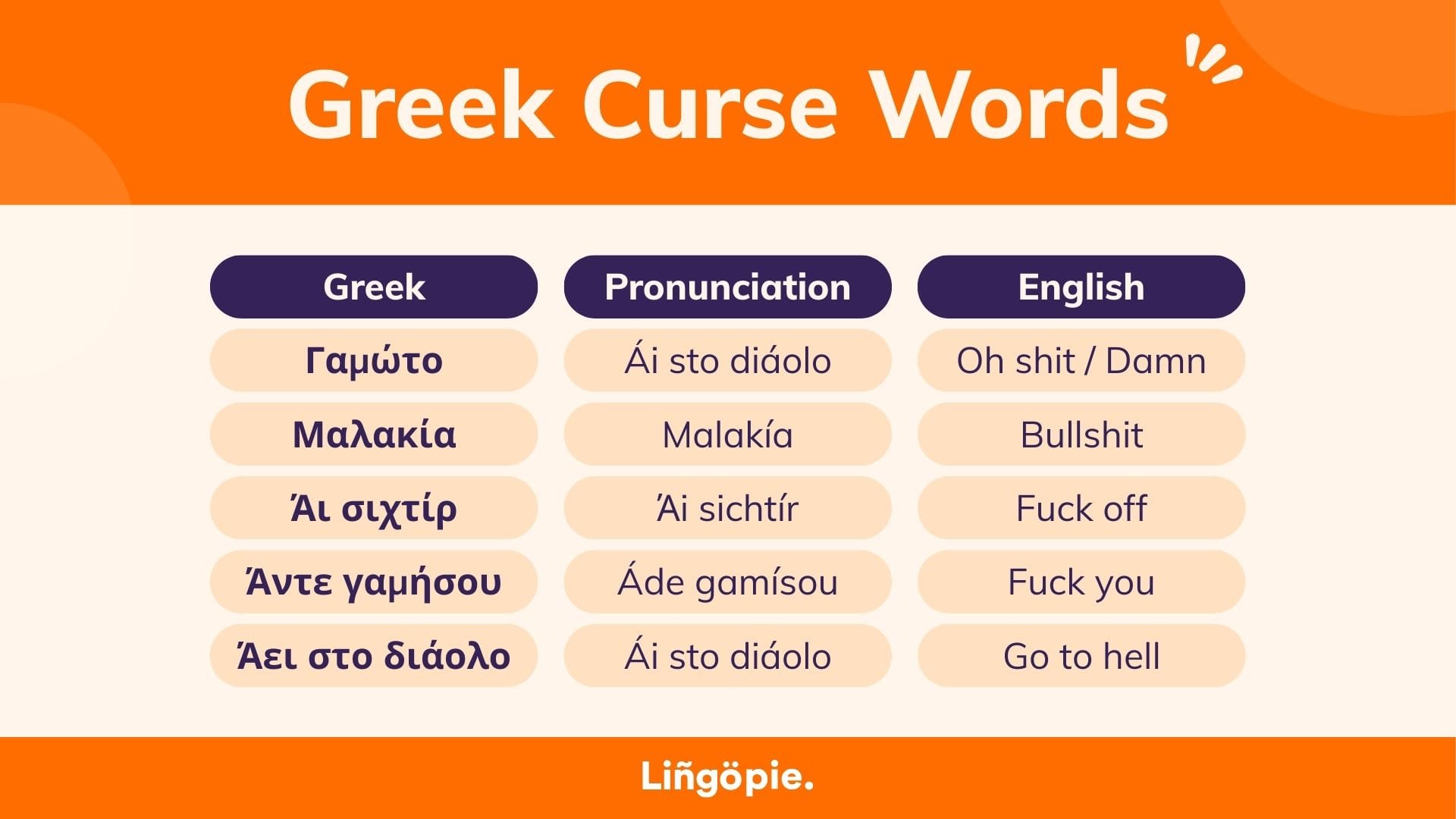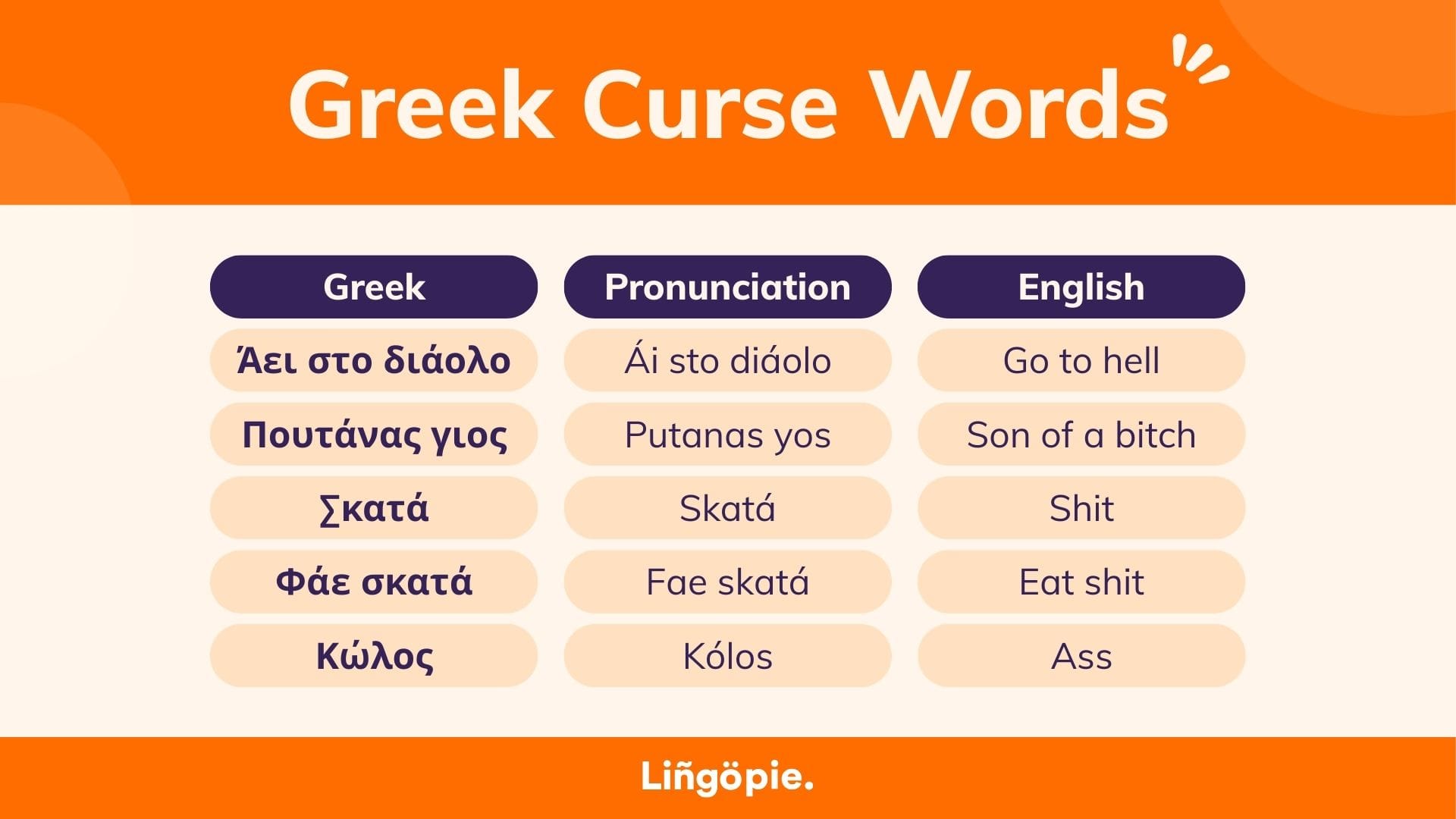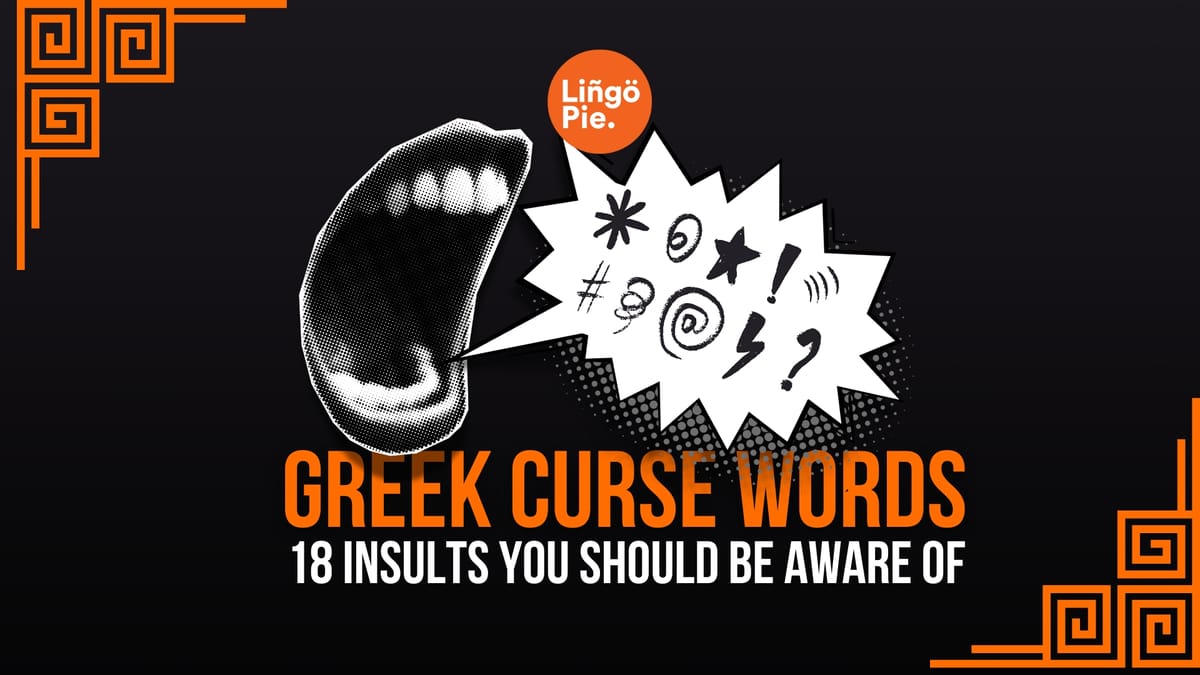Most Greek lessons focus on ordering coffee and asking for directions. But step into any Greek household, watch a local football match, or sit in Athens traffic, and you'll hear an entirely different vocabulary. Learning Greek curse words is essential because they play a big role in the culture.
To help you out, I rounded up the most important Greek insults and curse words in Greek you’ll encounter in real conversations. However, just know that we're teaching you this for the sake of understanding, not usage.
- What Is The Best Way To Learn Greek? Guide + Tips [2025]
- 25+ Greek Slang Words That Make You Sound Like a Local
- 6 Best Greek Language Apps For Beginners

Greek Curse Words And Phrases
Gamóto (Γαμώτο) – Oh shit / Damn
This exclamation literally translates to "fuck it" and comes from the root word "gaméo" (to have sex). Greeks use it constantly to express anger, frustration, or disappointment, especially while driving. It’s also extremely versatile and can be combined with other words to create stronger expressions, making it one of the most essential Greek swear words you’ll hear in daily conversation.
Malakía (Μαλακία) – Bullshit
Literally meaning "masturbation," this noun form refers to situations, ideas, or actions that are foolish, stupid, or nonsensical. You might also hear it with additional words like "Ti malakía!" meaning "What nonsense!" when someone finds something ridiculous or poorly done.

Άi sichtír (Άι σιχτίρ) - Fuck off
This is actually a foreign (non-Greek) expression that means "go to hell". The phrase has Turkish origins and entered Greek slang as borrowed vocabulary, and is mainly used to tell someone to get lost or go away.
Áde gamísou (Άντε γαμήσου) – Fuck you
This aggressive phrase combines "ade" (come on/go) with "gamisou" (fuck yourself) to create the equivalent of "go fuck yourself". The root "gaméo" appears throughout Greek profanity, reflecting the culture's connection to sexuality that dates back to ancient Greek mythology.
Ái sto diáolo (Άει στο διάολο) – Go to hell
This phrase literally means "go to hell," but is used much more frequently than its English equivalent. It's considered somewhat old-fashioned and not as strong as other curses, but it is still rude. Technically, Greeks use it for dismissal ("get away from me"), condemning stupidity ("what a dick"), or expressing reluctance ("no way").
Putanas yos (Πουτάνας γιος) - Son of a bitch
This direct translation means "son of a bitch" and combines "putana" (whore) with "yos" (son). It's a straightforward insult that attacks someone's mother's reputation, which is particularly offensive in Greek culture. The phrase follows the common Greek pattern of incorporating sexual references into curse words.

Skatá (Σκατά ) – Shit
This word literally means "feces" and is the vulgar Greek equivalent of the English "shit". It's less vulgar than "Scheiße" but still impolite, making it suitable when something goes wrong without being too offensive. Beyond its literal meaning, "skata" can describe something of low quality or disappointing.
Fae skatá (Φάε σκατά) - Eat shit
This phrase literally translates to "eat shit" and is used as a hostile dismissal. It's an aggressive way to tell someone to go away or that you're fed up with them. You probably heard this Greek curse in the full phrase "Fae skata kai psofa re malaka," which means "eat shit and die, you wanker."
Kólos (Κώλος) – Ass
This word simply means "ass" and refers to the buttocks. It's often used as a prefix with other curse words to make them stronger, like "kolo-malakas". Greeks incorporate "kolos" into creative expressions, like saying someone "wrote me on their butt" when they've been stood up.
Hése mas (Χέσε μας) – Bite me / Fuck off
This phrase literally translates to "take a shit on us" but functions as the Greek equivalent of "bite me" or "fuck off". It's described as a somewhat funny expression used to show annoyance or anger. Greeks also use the similar phrase "Gamise mas" (literally "fuck us") with the same dismissive meaning.
Papária (Παπάρια) – Balls / Testicles
This word is simply another term for testicles in Greek slang. It's one of several Greek words referring to male anatomy, alongside more common terms like "archídia." It appears in lists of synonyms that include "psoli," "poutsa," "kavli," and other vulgar terms for male genitalia.
Pútsos (Πούτσος) – Cock / Dick
This masculine noun literally means "dick" or "cock" and has feminine ("poutsa") and neutral ("poutsaki" for small dick) variations. Greeks use "poutsos" in expressions like "Είσαι για τον πούτσο" (you're useless) or "Πούτσες μπλε" (blue dicks, meaning what you're saying isn't valid). The word can also stand alone in plural form "poutses" to mean "bullshit".
Greek Insults
Malákas (Μαλάκας) – Jerk / Asshole
Literally meaning "man who masturbates," this is arguably the most versatile Greek curse word, functioning as both insult and term of endearment depending on context and tone. Among friends it can mean "dude" or "mate," but in traffic or formal situations it's always an insult meaning "jerk" or "idiot".
Karyolis (Καριόλης) - Asshole
This word's literal meaning refers to a bed people used for intimate purposes in the past, but today it simply means calling someone a jerk or asshole. It's another way Greeks express contempt for someone's behavior without being as strong as some other curse words.
Arhídeea (Αρχίδια) – Testicles
This word comes from Byzantine Greek and literally means testicles, but Greeks use it in many creative expressions. Common phrases include "gráfo sta archídia mou" (I write it on my balls, meaning "I don't give a damn") and the saying "if my granny had balls I'd call her grandad".
Greeks can also get creative with ball-related expressions like "archídia kaplama" (bollocks) or "archídia me louloúdia" (balls with flowers).
Putána (Πουτάνα) – Bitch / Whore
This straightforward term means "whore" and is used as a strong insult toward women. Greeks incorporate it into expressions like "gínete tis putánas" (literally "the whore is happening") to describe crowded or chaotic situations. It's one of the harsher terms in Greek and carries significant offensive weight.
Ilíthios (Ηλίθιος) – Idiot
This word simply means "idiot" and is a more straightforward insult without the sexual or scatological references common in other Greek curse words. It's relatively mild compared to other terms on this list and focuses purely on questioning someone's intelligence rather than attacking their character or family.
Vlákas (Βλάκας) – Stupid
Another direct insult meaning "stupid," this word is commonly used to call someone an idiot without being particularly vulgar. Depending on usage, the final "s" might be omitted, appearing as "vlaka" in some contexts. It’s one of the more socially acceptable ways to express frustration with someone's actions.
Common Mistakes When Learning How to Swear in Greek
Learning Greek curse words might seem straightforward, but there are several cultural landmines that can turn a casual conversation into an awkward situation. The biggest trap is assuming that knowing the literal translation means you understand when and how to use these words. Context, tone, and your relationship with the person you're speaking to completely change the meaning.
- Using "malakas" everywhere: Just because it's the most famous Greek curse word doesn't mean it fits every situation. Save it for very casual settings with people you know well.
- Ignoring gender and formality: Greek curse words change based on who you're talking to. What works with a 20-year-old in a bar won't work with your friend's grandmother at dinner.
- Copying what you hear in movies: Greek films and TV shows often exaggerate cursing for dramatic effect. Real conversations are usually less intense.
- Mixing curse words randomly: Greeks have specific combinations that sound natural. Random mixing makes you sound like a confused tourist, not a local.
- Forgetting the religious context: Greece is still a religious country. Curse words involving religious figures are particularly offensive and can get you in serious trouble.
- Assuming they're just "fun words": These aren't party tricks. Used incorrectly, they can damage relationships, offend people, or even get you kicked out of establishments.
Resources to Complement Your Learning
Understanding Greek curse words is just one piece of the language puzzle. To truly grasp when and how these expressions fit into real conversations, you need exposure to authentic Greek content and native speakers who can guide you through the cultural nuances that textbooks skip.
Lingopie
This streaming platform offers Greek TV shows and movies with interactive subtitles, letting you see curse words in their natural context. You can click on any word for instant translations and save expressions for later practice, making it perfect for understanding how Greeks actually use these words in real situations.
YouTube Channels
Search for Greek comedy shows, street interviews, or vlogs to hear authentic conversations. Channels featuring Greek stand-up comedy or reaction videos often include casual cursing that shows you the difference between playful and aggressive usage.
Online Greek Forums
Join Greek-language Reddit communities or Facebook groups where natives discuss everything from politics to sports. Reading comment threads gives you insight into how Greeks write these words and what triggers their use, plus you can ask questions about context and appropriateness.
Ready to Hear These Words in Action?
Lists and definitions only get you so far. The real challenge with Greek curse words isn't memorizing them. It's about knowing when that "malaka" is friendly banter versus a genuine insult. You need to hear native speakers use these words in actual conversations to understand the tone, timing, and context that make all the difference.
Lingopie gives you access to Greek shows and movies with interactive subtitles, so you can click on any curse word for instant meaning and context. You’ll see how Greeks really talk, not just how textbooks think they should.
Ready to move beyond vocabulary lists? Try Lingopie free and learn Greek curse words the way natives actually use them.






![How To Say I Love You In Greek Like A Native Speaker [GUIDE]](/blog/content/images/size/w300/2026/02/How-To-Say-I-Love-You-In-Greek.png)
![How To Say Happy New Year In Greek [Guide]](/blog/content/images/size/w300/2025/12/how-to-say-happu-new-year-In-Greek-1.png)

![How Long Does It Take To Learn Greek? [Guide]](/blog/content/images/size/w300/2025/11/How-Long-Does-It-Take-To-Learn-Korean.jpg)